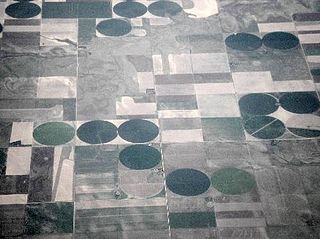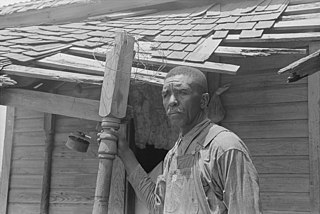Related Research Articles

A farmer is a person engaged in agriculture, raising living organisms for food or raw materials. The term usually applies to people who do some combination of raising field crops, orchards, vineyards, poultry, or other livestock. A farmer might own the farm land or might work as a laborer on land owned by others. In most developed economies, a "farmer" is usually a farm owner (landowner), while employees of the farm are known as farm workers. However, in other older definitions a farmer was a person who promotes or improves the growth of plants, land or crops or raises animals by labor and attention.

A farm is an area of land that is devoted primarily to agricultural processes with the primary objective of producing food and other crops; it is the basic facility in food production. The name is used for specialized units such as arable farms, vegetable farms, fruit farms, dairy, pig and poultry farms, and land used for the production of natural fiber, biofuel and other commodities. It includes ranches, feedlots, orchards, plantations and estates, smallholdings and hobby farms, and includes the farmhouse and agricultural buildings as well as the land. In modern times the term has been extended so as to include such industrial operations as wind farms and fish farms, both of which can operate on land or sea.

A tenant farmer is a person who resides on land owned by a landlord. Tenant farming is an agricultural production system in which landowners contribute their land and often a measure of operating capital and management, while tenant farmers contribute their labor along with at times varying amounts of capital and management. Depending on the contract, tenants can make payments to the owner either of a fixed portion of the product, in cash or in a combination. The rights the tenant has over the land, the form, and measures of payment vary across systems. In some systems, the tenant could be evicted at whim ; in others, the landowner and tenant sign a contract for a fixed number of years. In most developed countries today, at least some restrictions are placed on the rights of landlords to evict tenants under normal circumstances.

Peon usually refers to a person subject to peonage: any form of wage labor, financial exploitation, coercive economic practice, or policy in which the victim or a laborer (peon) has little control over employment or economic conditions. Peon and peonage can refer to both the colonial period and post-colonial period of Latin America, as well as the period after the end of slavery in the United States, when "Black Codes" were passed to retain African-American freedmen as labor through other means.

Sharecropping is a legal arrangement with regard to agricultural land in which a landowner allows a tenant to use the land in return for a share of the crops produced on that land.
A leasehold estate is an ownership of a temporary right to hold land or property in which a lessee or a tenant holds rights of real property by some form of title from a lessor or landlord. Although a tenant does hold rights to real property, a leasehold estate is typically considered personal property.
In property law, a concurrent estate or co-tenancy is any of various ways in which property is owned by more than one person at a time. If more than one person owns the same property, they are commonly referred to as co-owners. Legal terminology for co-owners of real estate is either co-tenants or joint tenants, with the latter phrase signifying a right of survivorship. Most common law jurisdictions recognize tenancies in common and joint tenancies.

The metayage system is the cultivation of land for a proprietor by one who receives a proportion of the produce, as a kind of sharecropping. Another class of land tenancy in France is named fermage, whereby the rent is paid annually in banknotes. A farm operating under métayage was known as a métairie, the origin of some place names in areas where the system was used, such as Metairie, Louisiana.
Sharefarming is a system of farming in which sharefarmers make use of agricultural assets they do not own in return for some percentage of the profits. Sometimes the sharefarmer will receive a wage from the owner instead, although such a person is normally considered a tenant farmer or farm labourer. Two common implementations of the sharefarming concept are sharecropping and sharemilking, although it is applied to other sorts of agricultural assets.
The crop-lien system was a credit system that became widely used by cotton farmers in the United States in the South from the 1860s to the 1940s.

Land reform in Scotland is the ongoing process by which the ownership of land, its distribution and the law which governs it is modified, reformed and modernised by property and regulatory law.
Agriculture continued to be the mainstay of the economy of Haiti in the late 1980s; it employed approximately 66 percent of the labor force and accounted for about 35 percent of GDP and for 24 percent of exports in 1987. The role of agriculture in the economy has declined severely since the 1950s, when the sector employed 80 percent of the labor force, represented 50 percent of GDP, and contributed 90 percent of exports. Many factors have contributed to this decline. Some of the major ones included the continuing fragmentation of landholdings, low levels of agricultural technology, migration out of rural areas, insecure land tenure, a lack of capital investment, high commodity taxes, the low productivity of undernourished animals, plant diseases, and inadequate infrastructure. Neither the government nor the private sector invested much in rural ventures; in FY 1989 only 5 percent of the national budget went to the Ministry of Agriculture, Natural Resources, and Rural Development. As Haiti entered the 1990s, however, the main challenge to agriculture was not economic, but ecological. Extreme deforestation, soil erosion, droughts, flooding, and the ravages of other natural disasters had all led to a critical environmental situation.

Agriculture in the United Kingdom uses 71% of the country's land area, employs 1% of its workforce and contributes 0.5% of its gross value added. The UK currently produces about 60% of its domestic food consumption.
Operation Barga was a land reform movement, throughout rural West Bengal for recording the names of sharecroppers (bargadars) while avoiding the time-consuming method of recording through the settlement machinery. It bestowed on the bargadars, the legal protection against eviction by the landlords (jotedars), and entitled them to the due share of the produce. Operation Barga was launched in 1978 and concluded by the mid-1980s. Introduced in 1978, and given legal backing in 1979 and 1980, Operation Barga became a popular but controversial measure for land reforms. The ultimate aim of these land reforms was to facilitate the conversion of the state's bargadars into landowners, in line with the Directive Principles of State Policy of the Indian Constitution. To date, Op Barga has recorded the names of approximately 1.5 million bargadars. Since then, it has been marked as one of the more successful land reforms programs in India.
The problem of land reform in Ethiopia has hampered that country's economic development throughout the late 19th and 20th centuries. Attempts to modernize land ownership by giving title either to the peasants who till the soil, or to large-scale farming programs, have been tried under imperial rulers like Emperor Haile Selassie, and under Marxist regimes like the Derg, with mixed results. The present Constitution of Ethiopia, which was put into force January 1995, vests land ownership exclusively "in the State and in the peoples of Ethiopia." The relevant section continues, "Land is a common property of the Nations, Nationalities and Peoples of Ethiopia and shall not be subject to sale or to other means of exchange." Despite these different approaches to land reform, Ethiopia still faces issues of sustainable food self-sufficiency.
The Lex Manciana is a Roman law dealing with tenancy agreements of imperial estates in Roman North Africa.
Land reform in the Philippines has long been a contentious issue rooted in the Philippines's Spanish Colonial Period. Some efforts began during the American Colonial Period with renewed efforts during the Commonwealth, following independence, during Martial Law and especially following the People Power Revolution in 1986. The current law, the Comprehensive Agrarian Reform Program, was passed following the revolution and recently extended until 2014.
Contract farming involves agricultural production being carried out on the basis of an agreement between the buyer and farm producers. Sometimes it involves the buyer specifying the quality required and the price, with the farmer agreeing to deliver at a future date. More commonly, however, contracts outline conditions for the production of farm products and for their delivery to the buyer's premises. The farmer undertakes to supply agreed quantities of a crop or livestock product, based on the quality standards and delivery requirements of the purchaser. In return, the buyer, usually a company, agrees to buy the product, often at a price that is established in advance. The company often also agrees to support the farmer through, e.g., supplying inputs, assisting with land preparation, providing production advice and transporting produce to its premises. The term "outgrower scheme" is sometimes used synonymously with contract farming, most commonly in Eastern and Southern Africa. Contract farming can be used for many agricultural products, although in developing countries it is less common for staple crops such as rice and maize.
This glossary of agriculture is a list of definitions of terms and concepts used in agriculture, its sub-disciplines, and related fields. For other glossaries relevant to agricultural science, see Glossary of biology, Glossary of ecology, Glossary of environmental science, and Glossary of botany.
A masoveria contract is a Catalan institution dating back to the tenth century and still in wide practice. It is a form of sharecropping by which the owner of a rural farm commissions a natural person to work in the farm in exchange for a percentage of the results of the crop or farm production. It usually involves also the right to live on the estate, often in a property different from the main building, properly known as masoveria.
References
- ↑ "Agriculture, Tenancy, and the Environment". kolibri.teacherinabox.org.au. Retrieved 2022-12-09.
- ↑ Ochiltree, Ian D. (1998). ""A Just and Self-Respecting System"?: Black Independence, Sharecropping, and Paternalistic Relations in the American South and South Africa". Agricultural History. 72 (2): 352–380. ISSN 0002-1482.